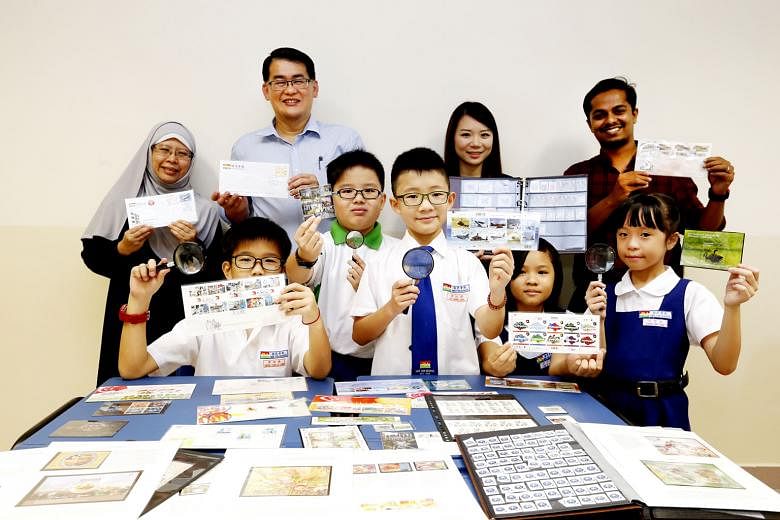Jon, the hapless cat owner in the comic strip Garfield, once sent his date running away in tears when he said in the middle of their romantic dinner: "Yes, stamp collecting can be very rewarding..."
At Mee Toh School in Punggol, there are 26 young Jons - stamp enthusiasts who meet on Tuesday afternoons to pore over colourful postage stamps, learning about history, geography and wildlife, under the tutelage of three teachers-in-charge.
The so-called Young Philatelist, one of the school's co-curricular activities, was started in January last year after principal Gau Poh Teck got together with the teachers to explore new ways of learning.
"I want my students to pick up 21st century skills like visual literacy, and cultivate the ability to make keen observations," he said.
An avid stamp collector himself, Mr Gau, 48, recently showed the pupils an item from his own collection, a postcard used during the Japanese Occupation of Singapore.
The pupils learnt from the postcard that Singapore was renamed Syonan-to by the Japanese, and that the Japanese wrote the year 1945 as 2605, counting from the reign of Emperor Jimmu, who legend says founded Japan in 660BC.
"These are interesting details that would be quite dry in the textbook," said Mr Gau. "It's about letting them (pupils) interact with the artefact and asking questions, piquing their thinking and curiosity instead of giving them facts to memorise."
The school itself acquires stamps with educational subject matter, such as those commemorating historic events or illustrating wildlife. Some stamps have also been donated by collectors.
Mr Gau said: "It's really how we use it (the collection) that adds value. As teachers, we customise and create value out of the content that we have."
Primary 4 pupil Lui Shing Cher, nine, said: "Every session is interesting and meaningful as we learn more from stamps, instead of just textbooks."
Stamps motivate him to do more research, he said. One of his favourite sets is a series showing different kinds of aircraft used by Singapore's air force, which he said helped him learn "how Singapore uses planes to defend the country".
Shing Cher and his schoolmates are already doing research for the annual National Stamp Collecting Competition (NSCC) organised by the Singapore Philatelic Museum (SPM) later this year, where they have to explain the significance of their collection.
SPM said 428 primary and secondary schools participated in last year's NSCC, and 576 in 2014, but the number of school stamp clubs is not known. The Straits Times understands schools need not have stamp clubs to compete.
One of the teachers-in-charge of Mee Toh's Young Philatelist, Ms Jessica Chong, 30, said: "It teaches the students information literacy - how to do research online, and computer skills like word processing, things they don't learn in the classroom."
Mr Eddie Yong, 58, a building manager, has the stamp clubs to thank for expanding his general knowledge.
He joined the stamp club at Queenstown library as a secondary school student around 1975. The club no longer exists.
Every month there would be a quiz, said Mr Yong. They would be shown stamps whose country names weren't in English - for example the Soviet Union, whose name resembled the letters "CCCP" - and people who identified the countries correctly would get a packet of stamps as a prize.
Some of the stamps were still on envelopes that bore special chops with messages about courtesy, crime prevention, and even warnings about the dangers of sexually transmitted diseases.
"During the 70s, TV was not so accessible to people, but through all these slogans you get an idea what's going on," said Mr Yong.
Stamps could even teach students to be caring and appreciative of others.
Last year the Young Philatelists of Mee Toh learnt about Singapore's Total Defence strategy through stamps. Ms Chong got them to write thank-you notes to national servicemen, which she asked her brother, who was serving NS, to pass on to his comrades.
Her brother told her the NSmen appreciated the notes.
And it all started from a stamp.


